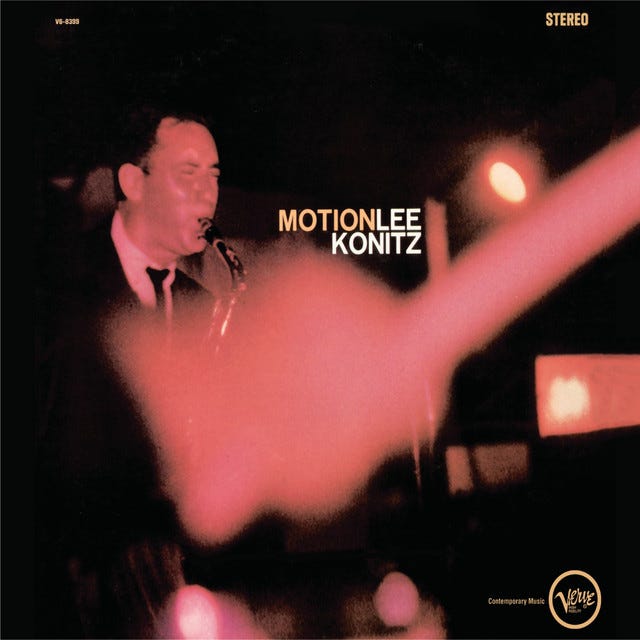Motion
by Lee Konitz
Label: Verve
Recorded: August 29, 1961
Released: 1961
★★★★½
Lee Konitz’s Motion (1961) remains one of the most captivating and singular statements in Jazz history. Recorded with drummer Elvin Jones and bassist Sonny Dallas, this album transcends the norms of its era. Eschewing the rigid structures typical of Jazz standards, Konitz approaches the five pieces on this album with a freedom and fluidity that demand active listening. The trio, recorded in a single spontaneous session, had never played together before, but the resulting chemistry feels nothing short of telepathic.
The spontaneity of the session is immediately apparent in I Remember You, where Sonny Dallas’ bass becomes the lifeline that tethers the listener to the song’s harmonic structure. Konitz and Jones, however, are explorers—constantly shifting across bar lines and behind the beat, creating phrases that almost defy the standard cycles we expect from familiar tunes. Dallas’ unwavering pulse keeps the trio grounded, while Konitz’s phrasing invites the listener to fill in gaps, completing sentences left deliberately open-ended. His alto tone, airy yet deeply resonant, evokes Paul Desmond at times, yet there is a refreshing absence of clichés in his improvisation. As David Liebman notes, Konitz’s phrasing on Motion pushes boundaries, often fragmenting or alluding to the head of a tune rather than fully stating it.
Elvin Jones, known for his thunderous performances with John Coltrane, demonstrates a completely different facet of his artistry here. In Motion, he’s subdued, yet maintains an intensity that elevates the music. His subtlety on the ride cymbal, combined with a more vertical style of drumming, creates space for Konitz to explore freely. The rumored story that Jones was positioned far from the microphone during recording is dispelled by Konitz himself; Jones simply showcases extraordinary restraint and control. His touch is especially poignant on Foolin' Myself, where his cymbals shimmer while Konitz provides harmonic support for Dallas’ bass solo. This reversal of roles speaks to the trio's intuitive interplay, with Konitz demonstrating a profound command of chord changes.
Tracks like All of Me further illustrate the improvisational ethos of the album. Konitz seems to lock into an "inner groove," reminiscent of a poet exploring free association. His approach to melody, often fragmentary and off-kilter, brings an emotional depth and unpredictability to these otherwise well-trodden standards. On You'd Be So Nice to Come Home To, Jones engages in brief moments of metric modulation, shifting the listener’s sense of time without disrupting the flow of the performance.
Perhaps what stands out most about Motion is the total absence of pretense. There are no grand arrangements or gimmicks to be found here—just three musicians engaged in a conversation as fluid and unpredictable as Jazz itself. It’s no wonder that the album received a "crown" accolade from the Penguin Guide to Jazz, marking it as one of the great modern Jazz records. Motion is, at its core, a masterpiece of subtlety, interaction, and spontaneity, capturing Konitz and his trio at the height of their creative powers.
Personnel
Lee Konitz • alto saxophone
Sonny Dallas • bass
Elvin Jones • drums
Tracklist:
1. I Remember You (Victor Schertzinger, Johnny Mercer)
2. All of Me (Gerald Marks, Seymour Simons)
3. Foolin' Myself (Jack Lawrence, Peter Tinturin
4. You'd Be So Nice to Come Home To (Cole Porter)
5. I'll Remember April (Gene DePaul, Patricia Johnston, Don Raye)
References:
Liebman, David "Unknown treasures – Lee Konitz' Motion"



